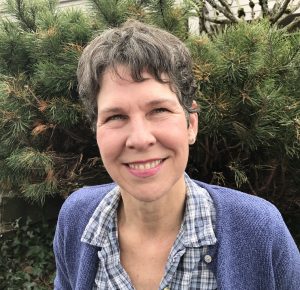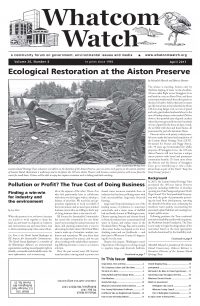by Kathryn Fentress

Jeremiah Crowder, longtime vendor, sells Real Change news outside the downtown Community Food Co-op. photo: Becky Spithill
Becky Spithill has masters’ degrees in environmental science and local government and urban/regional planning. She worked for city of Bellingham in water treatment from 1993 to 2000. She worked in Washington, D.C. with the U.S. Government Accountability Office during the Bush administration. From there she relocated to Seattle to work for King County Executive Ron Sims. When Sims left to serve as HUD’s deputy secretary in the Obama administration, Becky worked in King County’s Office of Economic Analysis. Three years ago, Becky and her husband moved back here, and she returned to her former job with the city.
Kathryn Fentress: Welcome back to Bellingham! How does it feel to have come full circle in your career?
Becky Spithill : This career evolution took me places that were ambitious, and yet, I didn’t feel I was making enough of a difference. Now that my daughter is grown, I have time to do more.
What is Real Change news?
It is an award-winning weekly newspaper that is a unique source of regional news and information about issues affecting economic, social, and racial justice. The mission is to provide opportunities for folks who are homeless to earn money, interface with others as they sell the paper and advocate about issues that directly affect them.
How did you decide to undertake the Real Change project?
During my time in Seattle, I became a fan of Real Change news through a favorite vendor. When Real Change advertised for board members, I stepped up. Reading the paper, serving on the board, and hanging out at the office gave me a different view of people who face homelessness. I became inspired to help change the situation. It’s a problem with many causes: systemic and institutional dysfunction, economic failure and social stigma, to name a few.
When we moved here, I resigned my seat on the board but maintained my connection to Real Change. Then I met Real Change news vendor Jeremiah selling papers at the Food Co-op. Jeremiah is an inspiration! He has a distinct business model that makes him successful. I decided then that we needed to make vendor opportunities available here, and Real Change for Whatcom County was born!
Whatcom County has so much to gain. Vendors and patrons will engage in day-to-day interactions that are positive and personal through sales of a newspaper that offers a social justice perspective via high quality objective journalism, as well as insightful editorials. This has such potential to change community attitudes and reduce the stigma attached to homelessness. We’ll come to see these folks as our neighbors. We will better understand the issues that face all our neighbors.
What is your plan in terms of infrastructure?
The current phase of the project is focused on gathering information; getting interested, committed people on board; and educating folks about Real Change. We are asking case managers who serve folks who are homeless to recommend prospective vendors. Later, we will open the opportunity to anyone who is interested.
What kind of support do you have so far?
The Real Change office in Seattle stands ready to welcome our vendors for vendor orientation, advanced sales training and other vendor opportunities. We’ve worked with other nonprofits in our area, and we hope to coordinate with Cascadia Volunteer Advocates as well.
Through its Department of Service Learning, Western facilitates the Community Engagement Fellows (CEF), which encourages faculty and staff to work with the community. I was invited to join CEF as a community member interested in advancing a project that would be collaborative and have potential benefit to the community. One of the CEF subcommittees in which I participate is focused on issues facing people who are homeless. For example, it has worked to provide storage for people who are homeless. These folks don’t have much but everything they have is important to them. Seizing these opportunities has moved the Real Change for Whatcom County project forward. Our own Real Change Working Committee is made up of nonprofit folks, students from WWU’s Human Services and Journalism departments, as well as representatives of Whatcom County’s homeless community. Our success, I believe, depends on wide community participation in bringing vendor opportunities to this area.
I am especially grateful to businesses that have stepped up so far. Stephanie and Ryan at Black Drop, Stephen at Terra Organica, and Stu at The Little Cheerful have all agreed to welcome vendors outside their businesses. Jeremiah has the downtown Food Co-op turf.
What happens after you select potential vendors?
Real Change Seattle will ship papers to us on Wednesdays, and we will make them available to our local vendors for $.60 each. Vendors will sell them for $2.00 each and keep the $1.40 profit and any tips they receive. The vendor experience here and the vendor experience in Seattle will be quite different. In Seattle, prospective vendors walk into the Real Change office on 1st Avenue a couple days a week, attend orientation, sign a code of conduct, get their starter papers, and they’re good to go. Our Whatcom County vendors will need a higher level of commitment, because they will spend the better part of a day to get started, what with travel to and from Seattle, the 90-minute orientation, and advanced sales training. Once the selling phase begins, some will find it challenging — it is not an easy thing initially to sell the paper. If they give it a go and they don’t like it, fine. But I believe there will be many who enjoy the work and will be successful.
How do you keep your spirits up?
It’s easy. I love Real Change, and this project is as rewarding as most anything I’ve ever done. The Working Committee members are supportive and enthusiastic. I enjoy talking with folks about their challenges and successes. Knowing we all face challenges helps me maintain perspective. Recently, I took two of our volunteers down to Seattle for a visit to the Real Change office, which was followed later the same day by the Real Change holiday party. These volunteers were introduced to Real Change leadership and staff, and they got to hang out with maybe a hundred vendors. They are still talking about the experience. Seeing their enthusiasm is rewarding and inspires me.
What can our readers do if they are interested?
We’d love to hear from business people. Connecting with the business community is critical to our success. Most recently, I’ve been invited to meet with the Historic Fairhaven Association in early March. And, we just got really great news: Whatcom Community Foundation has awarded us a grant, which will cover the cost of the six-month project to establish Real Change for Whatcom County. This will be a tremendous help as we expand vendor opportunities, which will require covering expenses for transportation, starter papers for our new vendors, weekly shipping, and public outreach. Until we develop a fundraising plan to sustain the project indefinitely, we will accept donations for our continuing work.
Thank you, Becky, for expanding the Real Change network and for all the support you offer our homeless neighbors.
Have Questions or Comments? Contact Becky Spithill, Real Change for Whatcom County: becky.spithill@gmail.com, 206-979-6815. For more information about the Real Change Homeless Empowerment Project, visit http://realchangenews.org/.
____________________________________
Kathryn Fentress and her husband moved to Bellingham 20 years ago for the water, trees, fresh air and mountains. She is a psychologist in private practice and believes that spirit is in everything. Living in harmony with nature reflects a reverence for life. She delights in finding and meeting those people whose stories so inspire all of us.





























